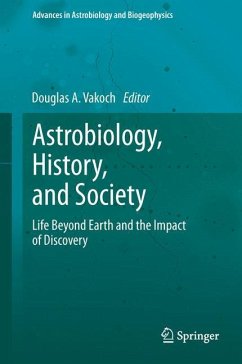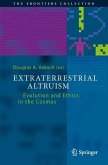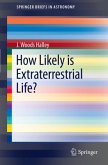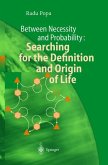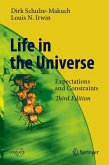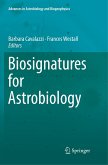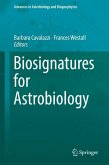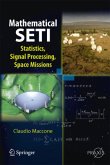This book addresses important current and historical topics in astrobiology and the search for life beyond Earth, including the search for extraterrestrial intelligence (SETI). The first section covers the plurality of worlds debate from antiquity through the nineteenth century, while section two covers the extraterrestrial life debate from the twentieth century to the present. The final section examines the societal impact of discovering life beyond Earth, including both cultural and religious dimensions. Throughout the book, authors draw links between their own chapters and those of other contributors, emphasizing the interconnections between the various strands of the history and societal impact of the search for extraterrestrial life.
The chapters are all written by internationally recognized experts and are carefully edited by Douglas Vakoch, professor of clinical psychology at the California Institute of Integral Studies and Director of Interstellar Message Composition at the SETI Institute.
This interdisciplinary book will benefit everybody trying to understand the meaning of astrobiology and SETI for our human society.
The chapters are all written by internationally recognized experts and are carefully edited by Douglas Vakoch, professor of clinical psychology at the California Institute of Integral Studies and Director of Interstellar Message Composition at the SETI Institute.
This interdisciplinary book will benefit everybody trying to understand the meaning of astrobiology and SETI for our human society.
From the reviews:
"In this book you can find out about the first philosophers, writers and scientists who were interested in the possibility of life on other planets and get to know the reasons why it was considered possible by them and what actually led to their depictions of life elsewhere in literature. ... Overall this book makes for really interesting reading if you're interested in extraterrestrial life and astrobiology." -- Kadri Tinn, AstroMadness.com, December, 2013
"In this book you can find out about the first philosophers, writers and scientists who were interested in the possibility of life on other planets and get to know the reasons why it was considered possible by them and what actually led to their depictions of life elsewhere in literature. ... Overall this book makes for really interesting reading if you're interested in extraterrestrial life and astrobiology." -- Kadri Tinn, AstroMadness.com, December, 2013
Selected by Choice magazine as an "Outstanding Academic Title" for 2014
"This book is a very well-balanced, detailed analysis of the subject. ... This is one of the best books on the subject; it belongs in all college libraries. Summing Up: Essential. All levels/libraries." (K. L. Schick, Choice, Vol. 51 (7), March, 2014)
"Are we alone in the universe? If not, then what might that mean? This fascinating volume offers a history of what Western cultures have thought about these questions ... . a useful source for scientists, historians, anthropologists, and many other disciplines that concern themselves with these two large questions. ... This volume nicely reveals the numerous ways in which anthropological knowledge and methods can help us think about and plan for managing the cultural impact of an eventual first contact." (James Strick, Journal for the History of Astronomy, Vol. 47 (1), 2016)
"In this book you can find out about the first philosophers, writers and scientists who were interested in the possibility of life on other planets and get to know the reasons why it was considered possible by them and what actually led to their depictions of life elsewhere in literature. ... Overall this book makes for really interesting reading if you're interested in extraterrestrial life and astrobiology." (Kadri Tinn, AstroMadness.com, December, 2013)
"This book is a very well-balanced, detailed analysis of the subject. ... This is one of the best books on the subject; it belongs in all college libraries. Summing Up: Essential. All levels/libraries." (K. L. Schick, Choice, Vol. 51 (7), March, 2014)
"Are we alone in the universe? If not, then what might that mean? This fascinating volume offers a history of what Western cultures have thought about these questions ... . a useful source for scientists, historians, anthropologists, and many other disciplines that concern themselves with these two large questions. ... This volume nicely reveals the numerous ways in which anthropological knowledge and methods can help us think about and plan for managing the cultural impact of an eventual first contact." (James Strick, Journal for the History of Astronomy, Vol. 47 (1), 2016)
"In this book you can find out about the first philosophers, writers and scientists who were interested in the possibility of life on other planets and get to know the reasons why it was considered possible by them and what actually led to their depictions of life elsewhere in literature. ... Overall this book makes for really interesting reading if you're interested in extraterrestrial life and astrobiology." (Kadri Tinn, AstroMadness.com, December, 2013)

